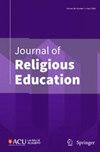瑞典、挪威、丹麦、巴伐利亚和柏林-勃兰登堡的RE教学大纲对儿童存在主义问题的不同课程反应
IF 0.8
0 RELIGION
引用次数: 1
摘要
课程如何认识义务教育学生的存在问题?如何解决这些问题又给出了什么方向?通过提出这两个问题,本研究分析了瑞典、挪威和丹麦,以及德国巴伐利亚州和柏林-勃兰登堡两个地区的宗教教育学校课程及其同类课程的教学大纲。这项研究是瑞典一个研究项目的一部分,1969年,瑞典将“生存问题”(在这里翻译为“存在问题”)的主题引入了课程。对不同语言中“问题”一词的用法进行定性的内容分析,是对现行教学大纲进行比较研究的基础。柏林-勃兰登堡和丹麦的教学大纲识别并以综合的方式解决学生的问题,而其他教学大纲则做得少得多。在儿童和课程之间的关系显著变化的例子。该研究的结果提出了存在维度和主体化如何在课程中得到表达的宗教教育和一般教学问题(参见《以世界为中心的教育中的Biesta》,Routledge, 2022)。此外,这个问题是关于学生的问题是否可以被理解为对他们在世界上的定位至关重要,并负责任地回应,例如在建设环境中。本文章由计算机程序翻译,如有差异,请以英文原文为准。
Varying curricular responses to children’s existential questions in RE syllabi from Sweden, Norway, Denmark, Bavaria and Berlin-Brandenburg
Abstract In which ways do curricula recognize existential questions of compulsory school students, and what direction is given regarding how to address them? By asking these two questions, this study analyses syllabi for the school subject of religion education and its equivalents in Sweden, Norway and Denmark, and in the two German regions of Bavaria and Berlin-Brandenburg. The study forms part of a research project based in Sweden where, in 1969, the theme of ‘ livsfrågor ’—translated here as ‘existential questions’—was introduced into the curriculum. A qualitative content analysis of the use of the word ‘question’ in the respective languages is the basis for the comparative study of the current syllabi. The Berlin-Brandenburg and Danish syllabi recognize and, in integrated ways, address students’ questions, while the other syllabi do so considerably less. Significant variations in the relationship between the child and the curriculum are exemplified. The results of the study raise both religion educational and general didactic questions of how existential dimensions and subjectification (cf. Biesta in World-centred education, Routledge, 2022) can find their expression in curricula. Additionally, the question is addressed of whether students’ questions can be understood as crucial in their orientation in the world and responded to responsibly, for example in a Bildung context.
求助全文
通过发布文献求助,成功后即可免费获取论文全文。
去求助
来源期刊

Journal of Religious Education
RELIGION-
自引率
50.00%
发文量
28
期刊介绍:
Journal of Religious Education is a refereed publication for the academic exploration of the task of religious education in modern society. The journal helps disseminate original writings and research in religious education and catechesis - particularly as it relates to the faith formation of children and young people. Articles for publication on religious education in various contexts and on related areas, as well as book reviews are welcome.
 求助内容:
求助内容: 应助结果提醒方式:
应助结果提醒方式:


